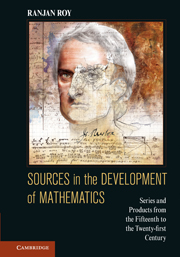 Sources in the Development of Mathematics
Sources in the Development of Mathematics Book contents
- Frontmatter
- Contents
- Preface
- 1 Power Series in Fifteenth-Century Kerala
- 2 Sums of Powers of Integers
- 3 Infinite Product of Wallis
- 4 The Binomial Theorem
- 5 The Rectification of Curves
- 6 Inequalities
- 7 Geometric Calculus
- 8 The Calculus of Newton and Leibniz
- 9 De Analysi per Aequationes Infinitas
- 10 Finite Differences: Interpolation and Quadrature
- 11 Series Transformation by Finite Differences
- 12 The Taylor Series
- 13 Integration of Rational Functions
- 14 Difference Equations
- 15 Differential Equations
- 16 Series and Products for Elementary Functions
- 17 Solution of Equations by Radicals
- 18 Symmetric Functions
- 19 Calculus of Several Variables
- 20 Algebraic Analysis: The Calculus of Operations
- 21 Fourier Series
- 22 Trigonometric Series after 1830
- 23 The Gamma Function
- 24 The Asymptotic Series for ln Γ(x)
- 25 The Euler–Maclaurin Summation Formula
- 26 L-Series
- 27 The Hypergeometric Series
- 28 Orthogonal Polynomials
- 29 q-Series
- 30 Partitions
- 31 q-Series and q-Orthogonal Polynomials
- 32 Primes in Arithmetic Progressions
- 33 Distribution of Primes: Early Results
- 34 Invariant Theory: Cayley and Sylvester
- 35 Summability
- 36 Elliptic Functions: Eighteenth Century
- 37 Elliptic Functions: Nineteenth Century
- 38 Irrational and Transcendental Numbers
- 39 Value Distribution Theory
- 40 Univalent Functions
- 41 Finite Fields
- References
- Index
- Frontmatter
- Contents
- Preface
- 1 Power Series in Fifteenth-Century Kerala
- 2 Sums of Powers of Integers
- 3 Infinite Product of Wallis
- 4 The Binomial Theorem
- 5 The Rectification of Curves
- 6 Inequalities
- 7 Geometric Calculus
- 8 The Calculus of Newton and Leibniz
- 9 De Analysi per Aequationes Infinitas
- 10 Finite Differences: Interpolation and Quadrature
- 11 Series Transformation by Finite Differences
- 12 The Taylor Series
- 13 Integration of Rational Functions
- 14 Difference Equations
- 15 Differential Equations
- 16 Series and Products for Elementary Functions
- 17 Solution of Equations by Radicals
- 18 Symmetric Functions
- 19 Calculus of Several Variables
- 20 Algebraic Analysis: The Calculus of Operations
- 21 Fourier Series
- 22 Trigonometric Series after 1830
- 23 The Gamma Function
- 24 The Asymptotic Series for ln Γ(x)
- 25 The Euler–Maclaurin Summation Formula
- 26 L-Series
- 27 The Hypergeometric Series
- 28 Orthogonal Polynomials
- 29 q-Series
- 30 Partitions
- 31 q-Series and q-Orthogonal Polynomials
- 32 Primes in Arithmetic Progressions
- 33 Distribution of Primes: Early Results
- 34 Invariant Theory: Cayley and Sylvester
- 35 Summability
- 36 Elliptic Functions: Eighteenth Century
- 37 Elliptic Functions: Nineteenth Century
- 38 Irrational and Transcendental Numbers
- 39 Value Distribution Theory
- 40 Univalent Functions
- 41 Finite Fields
- References
- Index
Summary
But this is something very important; one can render our youthful students no greater service than to give them suitable guidance, so that the advances in science become known to them through a study of the sources. – Weierstrass to Casorati, December 21, 1868
The development of infinite series and products marked the beginning of the modern mathematical era. In his Arithmetica Infinitorum of 1656, Wallis made groundbreaking discoveries in the use of such products and continued fractions. This work had a tremendous catalytic effect on the young Newton, leading him to the discovery of the binomial theorem for noninteger exponents. Newton explained in his De Methodis that the central pillar of his work in algebra and calculus was the powerful new method of infinite series. In letters written in 1670, James Gregory presented his discovery of several infinite series, most probably by means of finite difference interpolation formulas. Illustrating the very significant connections between series and finite difference methods, in the 1670s Newton made use of such methods to transform slowly convergent or even divergent series into rapidly convergent series, though he did not publish his results. Illustrating the importance of this approach, Montmort and Euler soon used new arguments to rediscover it. Newton further wrote in the De Methodis that he conceived of infinite series as analogues of infinite decimals, so that the four arithmetical operations and root extraction could be carried over to apply to variables.
- Type
- Chapter
- Information
- Sources in the Development of MathematicsSeries and Products from the Fifteenth to the Twenty-first Century, pp. xvii - xxPublisher: Cambridge University PressPrint publication year: 2011
